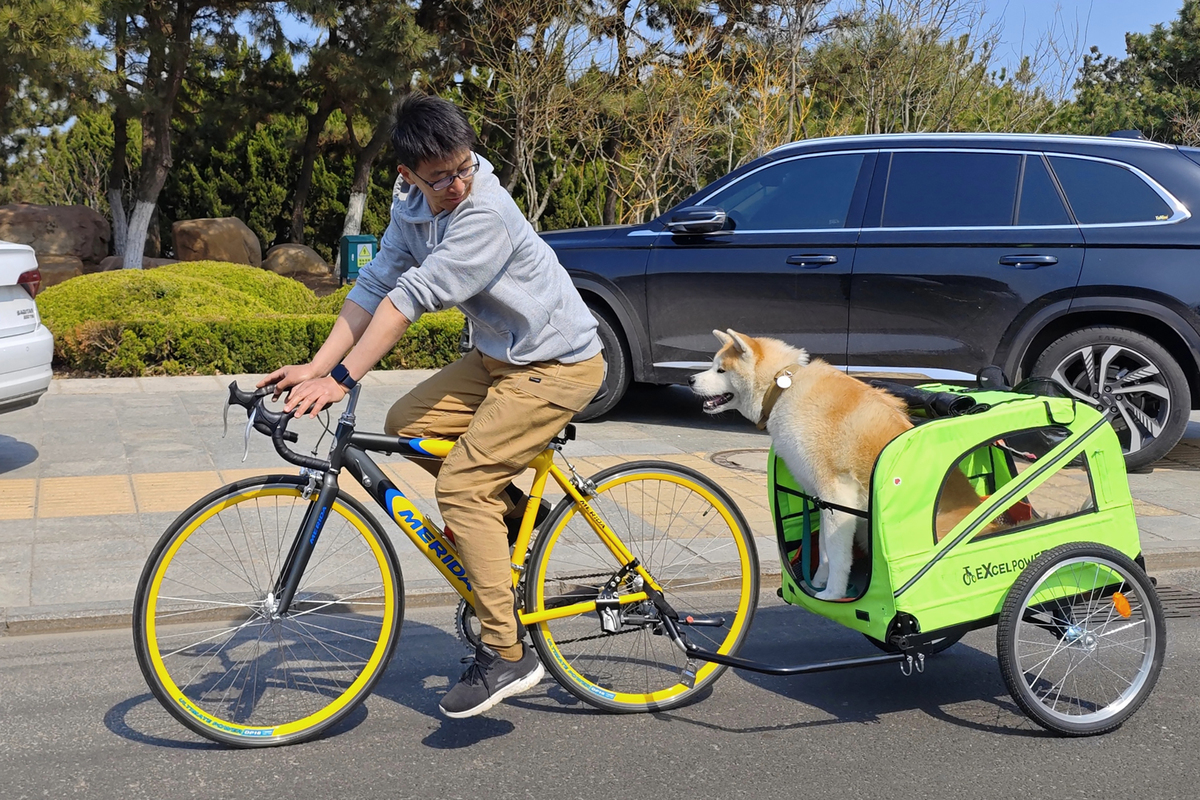Wanderlust for pet travel unleashes market potential
Tourism operators profit from owners' desire to take furry companions on holidays


Flying start
Public transportation authorities have rolled out special services in recent years to meet the needs of owners who travel with their pets.
Although pets are currently not allowed on high-speed trains, some railway operators have begun exploring the possibility of permitting small pets to travel under certain conditions. In May, the country's railway customer service center launched a survey to gauge passengers' opinions on the issue.
Airline companies have started to offer chartered services for owners and their pets.
In 2022, Zeng from Hangzhou noticed some airlines were offering pet-carrying travel services and he immediately signed up for one. In the past, he mostly took self-driving tours to mountainous areas in Jiangsu province, Zhejiang and Shanghai.
The first long-distance flight he took with his dogs was to Xishuangbanna Dai autonomous prefecture, Yunnan province, in January 2022.
Zeng said it was an unforgettable trip. He made friends with about 30 other dog owners during that journey, which lasted about a week. "Most of them were warmhearted and full of love, and we understood each other and looked out for one another's dogs," he said.
Airline companies like Shanghai-based Juneyao Air arrange pet tours once every three months, Zeng has noticed, while Hainan Airlines sometimes allows pet owners to take their dogs on flights but they must occupy the last row.
The price of a domestic flight for a dog ranges from 3,500 to 7,000 yuan and is double the amount for big canines, he said.
As he travels more with his dogs, Zeng said he is noticing significant improvements in pet-related travel services.
"Each time the check-in and boarding process becomes more streamlined, and the environment gets friendlier," he said.
For instance, previously he had to separate from his dogs to go through the security check and reunite with them after boarding. Now he can take his dogs directly on the plane.
"This is so much more thoughtful and humane," he said.
Overseas trip
On June 14, China's first outbound charter flight allowing pets landed at Shanghai Pudong International Airport after taking a group to Thailand. The flight was organized by a company called I Baby Go.
A total of 60 tourists and 18 pet dogs spent nine days in Bangkok and Pattaya and smoothly passed customs checks.
"They need to submit documentation such as a valid quarantine certificate issued by the official animal quarantine agency of the exporting country or region and a rabies vaccination certificate," said Yin Na, an official with the Shanghai Pudong Airport's customs inspection department.
Yin said a pet returning to China must go through several quarantine and health checks before being allowed back into the country.
"For non-designated countries or regions (not officially recognized by the authorities), a rabies antibody test report is also required, and you must go through the entry pet clearance procedures," Yin said.
"Pets with complete and qualified documentation and no abnormalities in on-site quarantine can be brought into the country by travelers without the need for quarantine."
A spokesman for I Baby Go said the Thailand trip was its first attempt at outbound pet tourism and more trips to South Korea, Southeast Asia and Europe will be planned.
Bounding ahead
Though domestic pet tourism is currently in its infancy and is a niche market facing many challenges, its impact and consumption potential are enormous, making it worthy of active exploration by the tourism industry, experts said.
Li Bin, a professor at Beijing International Studies University's School of Tourism Sciences, said cultural and tourism enterprises should go beyond offering boarding and care services for pets.
They should create more play areas for pets, enabling increased interactions between pets and humans, which is a crucial step in developing the pet tourism market.
Relevant authorities should establish and improve regulations and standards related to the pet tourism market to guide and foster a positive pet-friendly consumption environment, Li added.
Zeng plans to continue traveling with Chai Chai and Ba Bao, and has booked a trip to the Ningxia Hui autonomous region and Gansu province in September.
"I have long been interested in traveling, and having dogs has in some way fueled my wanderlust," he said, adding that the difference now is putting his dogs' needs first when planning a trip.
Zeng believes he will have more options when traveling with his dogs in the future.
"More chain hotels and destinations have offered nice experiences for pets, and even the outbound trips are now conveniently available," he noted.
"I will try and go as far as possible with my dogs and let them see what the world has to offer," he said.
























